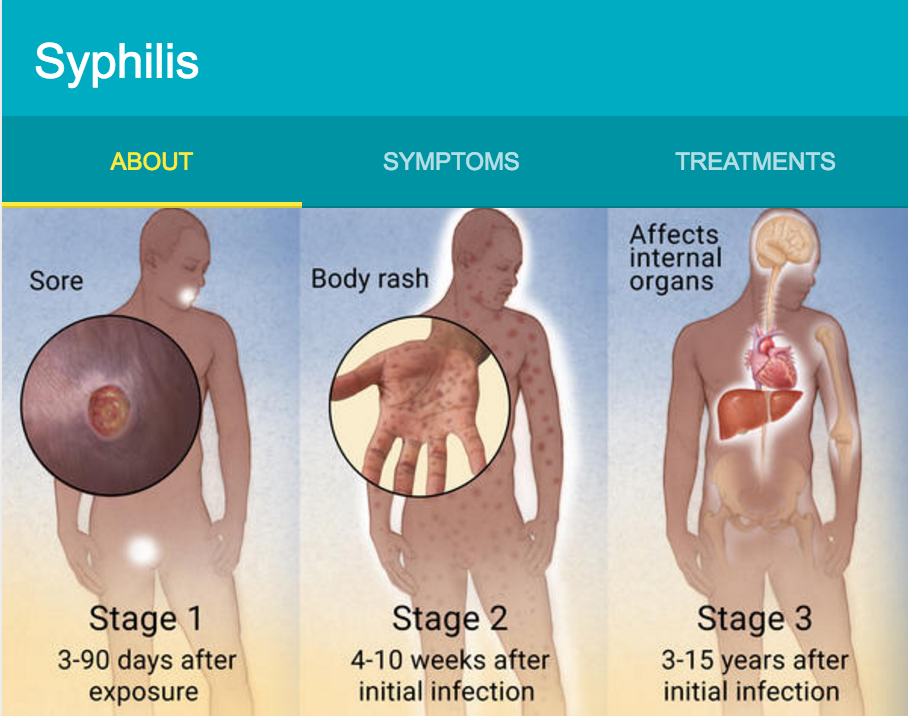Why Syphilis is a Threat During a Survival Situation
Not a lot of people talk about sexually transmitted diseases and survival preparedness in the same sentence. However, just like any other form of communicable diseases, STDs can be life-threatening if treatment is delayed, and this is particularly true of syphilis. Let’s take a look at some of the signs and symptoms in order to identify this potentially-fatal disease and seek out appropriate medical care when necessary.
Four Stages of Development
Syphilis is caused by a bacterial infection and it advances through four stages over the course of time. The first sign of infection is usually the presence of sores on the genitals or mouth where the bacteria enters the body. These sores can be painless and usually appear within a few weeks to a couple of months after exposure. They also heal on their own after about the same amount of time. However, it is important to note that Syphilis is still present in the body after these sores heal.
The second stage is the formation of a rash that develops between two weeks and three months after the appearance of the sores. The rash is common on the feet and hands, but can be present in other parts of the body as the infection spreads. This is the time when someone is highly contagious. The rash will normally heal on its own after about two months.
The third stage is when the infection starts to significantly interfere with bodily processes. The victim may have a persistent low-grade fever, sore throat, weakness or general malaise, patchy hair loss, including the eyebrows and eyelashes and swollen lymph nodes. Problems with the nervous system can develop and the victim may experience abnormal pupil behavior, a stiff neck, degradation of reflexes, paralysis and irritability.
Dormancy
Before going into the last stage, many patients experience relief from symptoms as the infection goes dormant. This can last anywhere from one to twenty years after exposure. This is the time when syphilis is difficult to detect without a blood test. However, the person is still contagious and the infection presents a serious health risk. People can also relapse numerous times during this stage, and symptoms can come and go quickly or be present for weeks or months. Generally speaking, the person is not contagious after the latent stage sets in and symptoms disappear.
Not everyone experiences the final stage of syphilis. However, those who do can develop serious cardiovascular problems, the development of large sores inside and outside of the body and permanent damage to the nervous system. Many of these advanced symptoms can lead to death.
Congenital Syphilis
One of the biggest threats of syphilis is that it can be passed on to babies during pregnancy. It is not uncommon for babies to die in the womb, after birth or have a host of life-long, debilitating medical conditions. Symptoms of congenital symptoms in babies can include contagious runny nose, rashes on the hands and feet, swollen lymph nodes, anemia, liver and spleen problems and stunted or abnormal physical and mental development.
Treatment
The good news is that the early stages of syphilis can be easily treated via antibiotic injections, primarily penicillin. However, the trick is to get treated as early as possible in order to reduce the spread of the bacteria throughout the body. Advanced stages are not curable due to the irreparable harm the bacteria does to the body. However, the bacteria can still be killed, so doctors generally provide antibiotic therapy and palliative care to make the patient more comfortable as the body degenerates.
Keep in mind that syphilis is most commonly spread when someone comes into contact with an exposed sore on the other person. Avoiding sexual contact during this time, using a condom and a dental dam will go a long way to reduce the chances of getting infected.
The reason we discuss syphilis here is primarily because of the risk of passing the infection from mother to child. If you think that you have contracted syphilis, see a doctor, take a simple test and get treated. The sooner you address this problem, the better chance you have at making a full recovery and eliminating this bacteria from your system. Remember that any illness is a challenge in a survival situation. Syphilis is something that you don’t want to contend with under the best of circumstances, let alone during the aftermath of a crisis.







